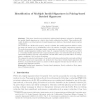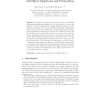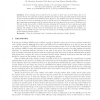137
click to vote
PKC
2009
Springer
16 years 3 months ago
2009
Springer
This paper describes new methods in pairing-based signature schemes for identifying the invalid digital signatures in a batch, after batch verification has failed. These methods ef...
121
Voted
PKC
2009
Springer
16 years 3 months ago
2009
Springer
Recently, the new Multibase Non-Adjacent Form (mbNAF) method was introduced and shown to speed up the execution of the scalar multiplication with an efficient use of multiple bases...
124
Voted
PKC
2009
Springer
16 years 3 months ago
2009
Springer
At Crypto'07, Goyal introduced the concept of Accountable Authority Identity-Based Encryption as a convenient tool to reduce the amount of trust in authorities in Identity-Bas...
124
Voted
PKC
2009
Springer
16 years 3 months ago
2009
Springer
Abstract. Traitor tracing schemes are cryptographically secure broadcast methods that allow identification of conspirators: if a pirate key is generated by k traitors out of a stat...
128
Voted
PKC
2009
Springer
16 years 3 months ago
2009
Springer
Similar to verifiable shuffling (or, mixing), we consider the problem of verifiable rotating (and random re-encrypting) a given list of homomorphic encryptions. The offset by which...
123
Voted
PKC
2009
Springer
16 years 3 months ago
2009
Springer
TCHo is a public key encryption scheme based on a stream cipher component, which is particular suitable for low cost devices like RFIDs. In its basic version, TCHo offers no IND-CC...
120
Voted
PKC
2009
Springer
16 years 3 months ago
2009
Springer
A key exchange protocol allows a set of parties to agree upon a secret session key over a public network. Two-party key exchange (2PKE) protocols have been rigorously analyzed unde...
122
Voted
PKC
2009
Springer
16 years 3 months ago
2009
Springer
We explore the security of blind signatures under aborts where the user or the signer may stop the interactive signature issue protocol prematurely. Several works on blind signatur...
108
Voted
PKC
2009
Springer
16 years 3 months ago
2009
Springer
We take a step towards a more realistic modeling of personal digital signatures, where a human user, his mobile equipment, his PC and a server are all considered as independent pla...
113
Voted
PKC
2009
Springer
16 years 3 months ago
2009
Springer
Abstract. We propose an asynchronous protocol for general multiparty computation with perfect security and communication complexity O(n2 |C|k) where n is the number of parties, |C|...





